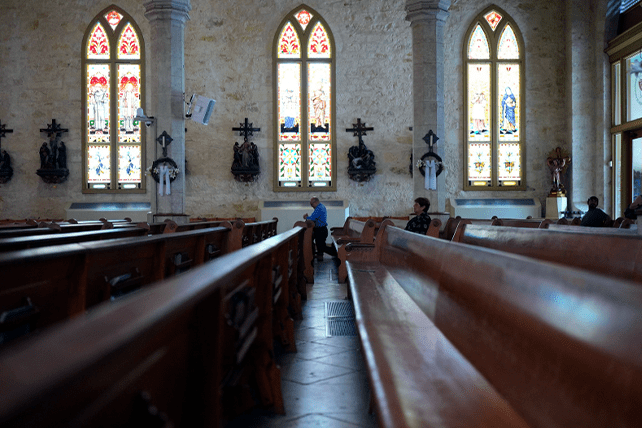(RNS) — At Celebration Church, a Portuguese- and English-speaking Baptist congregation in the Boston area, the benevolence fund is supposed to be there to help church families meet basic needs, such as food, clothing and heat, throughout the year. But in April, three months into President Donald Trump’s campaign to deport immigrants, the money had already been almost completely spent.
“If a family member has been detained, the church tries to mobilize to help the families in need,” said Celebration’s pastor, Josias Souza, adding that many other immigrant congregants are afraid to show up to work. “If a person doesn’t work, they don’t get paid,” Souza said.
At Our Family, a multilingual church in the Orlando, Florida, area, the Rev. Lecio Dornas, lead pastor to the church’s Brazilian members, said fear of raids at workplaces or of being stopped while commuting has been the biggest impact of the crackdown on his community, too.
According to Dornas, the resulting hit on members’ incomes on one hand lowers offerings, and on the other, creates greater need for assistance.
As their congregants live in fear of being detained and deported, pastors of churches serving immigrant populations across the country are not only searching for ways to reassure their congregations, but how to care for them and sustain their churches financially.
At the oldest standing house of worship in Texas, San Antonio’s Catholic San Fernando Cathedral, the rector, the Rev. Carlos Velázquez, said the tension over potential detention or deportation is thought to have caused lower attendance at Fiesta San Fernando, part of an annual citywide festival, Fiesta San Antonio, that dates back to 1891.
“ We’re attributing (that to) the fact that people don’t want to go out right now,” Velázquez said. “They’re scared.” The people who did come out spent less, which Velázquez attributes to their economic uncertainty.
The 287-year-old cathedral stands about three blocks from the U.S. Justice Department’s San Antonio Immigration Court, where immigrants’ deportation cases are increasingly being dismissed at the behest of government lawyers, allowing them to be detained by Immigration and Customs Enforcement for expedited removal outside the courtroom. (The archdiocese is working to inform immigrants of their right to request a virtual hearing to remove the risk of an ICE arrest at court.)
Normally one of the year’s biggest fundraisers, Fiesta San Fernando came up short, and Velázquez said he will probably defer maintenance on the 22-year-old building he lives in, where moisture is creating cracks in the roofline. “ It’s pretty major, but it’s something that we’re going to have to put aside,” he said.
At St. Thomas the Apostle, one of the largest Catholic parishes in Los Angeles, the pastor, the Rev. Mario Torres, decided to postpone the parish’s early July St. Thomas fiesta to early September because about half of those he spoke to said they were scared to attend.

